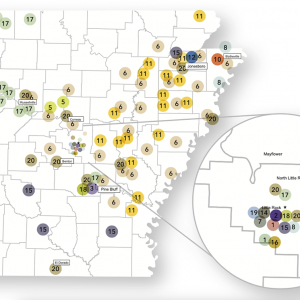Building a Credit Score (Without Going Into Debt!)
By Beth Dedman on Thursday, March 20, 2025
A credit score is a rating of how trustworthy you are when it comes to repaying borrowed money. This is determined by a number of factors:
• Payment history: paying bills and loans on time every time. Late payments are one of the best ways to wreck your credit. This assessment makes up 35% of your score.
• How much money you owe versus how much you can borrow. If you are approved to borrow $1,000 and you borrow all of it, that makes you a high-risk borrower. The less you use your revolving credit (like a credit card) and the more you pay off on your installment credit (like a student loan), the better your score will be. This makes up 30% of your credit score.
• The types of credit you use. Creditors like to see that you are able to handle multiple kinds of credit. Having both installment and revolving credit will help boost this score. This makes up 15% of your credit score.
• Credit inquiries. Hard inquiries are instances when you apply for new lines of credit. Opening lots of credit cards all at once will negatively affect your score. Soft inquiries are instances when you ask to view your credit report and don't affect your score. This makes up 10-12% of your credit score.
• The length of your credit history. The longer you prove that you are responsible at handling debt and credit, the more trustworthy credit agencies will find you. This is why many older people have better credit scores than people just starting out. This makes up about 7% of your credit score.
Having no credit at all is worse than having bad credit. This may seem counterintuitive, but that means that it is more advantageous to have a little debt than it is to never have debt. Someone who pays student loans, a car payment and a credit card (on time) may have more financial obligations, but they also have a better credit score than the person who had all of their college paid for and has never had a credit card.
“So, I need to go into debt on purpose?”
Yeah, kind of.
Potential employers, apartment complexes and utility companies can all use your score to determine if you will pay your balance on time and if you're financially responsible. You may be denied an apartment or a job if you have bad credit.
So, you have to have credit. To have credit, you have to borrow money, meaning that, yes, you need to have a little bit of debt. But preferably, only as much as you can pay back (in the case of credit cards) and pay down (in the case of loans) every month.
Tips for building credit:
• Don't spend more than you can afford. Limit using your credit card to paying for expenses like groceries and gas and repay the card in full at the end of every month.
“If you are successful at establishing and following a budget, a good credit score should be easy to achieve,” says Hillis Schild, director of communication and community development at Arvest Bank.
• Pay your bills on time. Late and missed payments can wreck your score.
• Keep credit use to a minimum. Only use credit cards for things like gas and groceries, so that you will not be seen as a high-risk borrower. Using less than 30% of the credit you are given gives you a good standing as a borrower. Using less than 10% will give you the best results. If you are allowed $1,000 of credit on your card, try to use less than $100.
• Have a few lines of credit open, but not too many. Having a diverse array of credit lines helps you appear more responsible. But if you have too many, you’ll look like a risk. Don’t suddenly cancel a credit card either; that’s bad for your score.
• Avoid paying interest. Pay off your credit card every month so that you don't incur interest fees. This is called being a "deadbeat borrower" because without paying interest, you are not giving the credit card company any more money than what you borrowed. This will boost your score and save you money.
When you’re first starting out, you do have options for getting around credit until you can build your score. You can get a guardian to co-sign on a loan, card or apartment lease as a guarantor (or co-signer). The guarantor essentially vouches for someone without credit as reliable. Being a guarantor can be risky. If someone defaults on their payments, then it is the responsibility of the guarantor to make the payment for them. If you get a guardian to co-sign on your loan, you better make sure you pay on time, otherwise you could hurt their credit too.
If you want to get started on building credit soon, you can ask your parents to make you an authorized user on their credit card. Make sure you don’t spend more money than you and your parents have agreed on because they will have to pay back anything you spend.
Once you are old enough, you could get your own credit card (probably with the help of a co-signer.) There are companies that offer special, low-interest cards for college-age students. You just need to make sure you do the proper research when choosing. Look for low-interest rates with as few fees as possible and don’t blindly agree to any terms and conditions.
$5,327
average credit card
debt in Arkansas*
*2021 CNBC
694
average credit score
in Arkansas*
*2020 Experian Consumer Credit Review
The Scary Kind of Interest
Unlike with savings accounts, compounding credit card interest is NOT your friend.
If you decide that your next step to building a credit history is to get a credit card, let’s talk about how to be careful with interest.
Not only do you need to pay back what you borrowed, but if you don’t pay your entire credit card balance when it’s due, you will be charged more money (interest).
How much extra you have to pay is determined by the interest rate. An interest rate is a percentage of the amount borrowed that is charged by a lender for letting you use its money. It is often expressed as APR or Annual Percentage Rate—and you want this number to be as low as possible! If you are just starting out with building credit, that can be difficult to negotiate. As of April 2021, the national average APR was 16.15%, and the lowest was 12.9%.*
Watch what happens when…

You put $1,000 on a credit card.
And only pay the 10% minimum balance due each month until the $1,000 is paid off.
Because of interest, it will take you two years and seven months to pay off your card.
During that time, you will have paid back $1,144.37—that’s $144.37 more than you originally spent!
And that’s only if you didn’t keep spending on the credit card during this time!
Paying down your credit card as fast as possible will help reduce the amount of interest you are charged. Better yet, if you pay off your card every month, you won’t accrue any interest. This is the best way to build your credit and not waste money.
*creditcards.com, April 2021
FREE WAYS TO CHECK YOUR SCORE
There are three primary credit monitoring bureaus that each provide borrowers with a credit score. These are Equifax, TransUnion and Experian.
• Experian’s free app updates your FICO® score every 30 days and will give you a credit summary, as well as alerts to key changes in credit activity.
• TransUnion’s app is also free, and while TransUnion scores and FICO® scores are different, they are similarly generated, and the TransUnion score should be able to give you a good idea of your rank.
• Other free apps include Intuit’s Mint Money app, Credit Karma and Credit Sesame.
• If credit apps aren’t your thing for soft inquiries, you can always download a free credit report at annualcreditreport.com
FICO® stands for Fair Isaac Corporation, which is the company that developed the credit scoring model used to make the majority of lending decisions in the U.S. (CEB TowerGroup Analyst Report)















